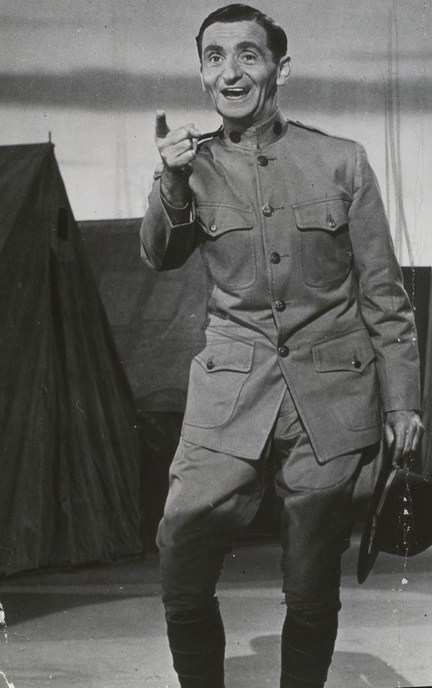Irving Berlin and Tin Pan Alley At War

Irving Berlin in This Is The Army, 1943
One of the most well-known and venerated writers of popular song in the United States, Irving Berlin played an outsized role in shaping the sonic landscape of wartime America. Immigrating from Russia as a boy, Berlin began his career as a singing waiter in saloons of The Bowery. Berlin became a favorite at these bars and was offered a job at a sheet music firm. Berlin soon after published “Alexander’s Ragtime Band” which became an international success and marked the start of Berlin’s tenure as one of Tin Pan Alley’s most successful songwriters.
In 1917, in the midst of World War I Berlin was drafted into the U.S. Army’s 152nd Depot Brigade. During the War Berlin mostly devoted his time to songwriting, eventually putting on a musical review using only soldiers entitled Yip Yip Yaphank. This musical is most notable for the one song that Berlin cut from its production that would resurface twenty years later, “God Bless America.”In the Interwar period, Berlin was prolific writing many dozens of hits including “Blue Skies” and “Puttin’ On The Ritz.” In 1938, “God Bless America” became a sensation after Kate Smith recorded the song; its popularity and patriotic message made it one of the most widely performed and disseminated songs of World War II.
When America entered the Second World War, Berlin wanted to serve as before writing songs in support of the breadth of the war effort such as “Any Bonds Today?” “I Paid My Income Tax Today,” and “Angels of Mercy in support of the American Red Cross. One of his most high-profile productions during the war was his re-staging of Yip Yip Yaphank adapting it into a new work for the second world war, This Is The Army. The work went through a laborious reconstruction including new compositions and the replacement of the earlier work's opening minstrel-show scene with a cast of over one hundred in blackface. By 1942 the show was taken on a national tour to raise funds for the war effort and the next year it was made into a film which was enormously successful. The film This Is the Army featured an all-soldier cast of some of the most well-known figures of the time who were either enlisted or affiliated with the U.S.O. such as Joe Louis, Frances Langford, and Ronald Reagan.
Outside of his propagandistic compositions, his holiday songs “White Christmas” and “Happy Holiday" became some of the best known of the wartime period, with the Bing Crosby Recording of the former still by some metrics ranking as the best selling single of all time. As families were separated during the holidays, these songs took on intense sentimental value for many as they hoped for reunion and an end to the war. Following the end of WWII, Berlin continued to write, retiring in the 1960s and remaining fairly private for the rest of his life. Berlin’s songs formed some of the bedrock of popular music in World War II and his music remains inescapable in the United States to the present.
The collection includes recordings of a number of Berlin's songs that saw popular resurgence in WWII including "Oh, How I Hate to Get Up In The Morning" and "God Bless America"
Billy Rose Theatre Division, The New York Public Library. "Irving Berlin" New York Public Library Digital Collections.
Sources Cited
Bergreen, Laurence. As Thousands Cheer : The Life of Irving Berlin. New York, NY: Viking, 1990.
Jones, John Bush. The Songs That Fought the War : Popular Music and the Home Front, 1939-1945. Waltham, Mass.: Brandeis University Press, 2006
